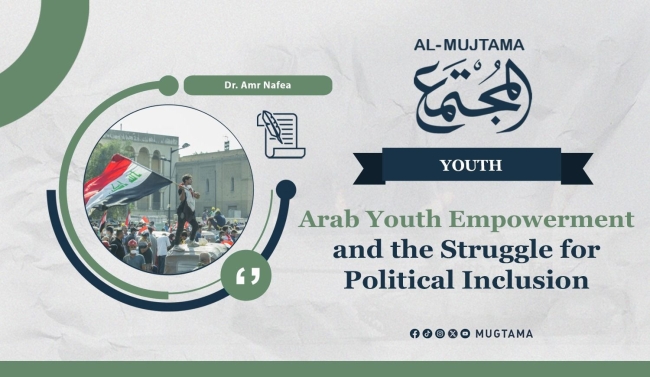Arab Youth Empowerment and the Struggle for Political Inclusion
In June 2019, the Elliott School of International Affairs at George Washington University, one of the world’s leading schools in international political studies, launched a project titled Youth Politics in the Middle East and North Africa under the Project on Middle East Political Science (POMEPS). The initiative organized a workshop on youth politics in Amman, Jordan, and some African countries, in collaboration with the Phoenix Center for Economic and Informatics Studies.
The papers and discussions at the workshop aimed to unpack the concept of “youth politics.” They explored questions like: What distinguishes the latest generation of youth from previous ones? How is youth activism evolving? What is their relationship with politics, public attitudes, and government policies? And, is it possible to generalize about the experience of being young and politically engaged in today’s Middle East?
Many Arab Youth Avoid Official Engagements and Turn to Social Networks
Youth in the Arab world represent a vital part of society, accounting for a significant portion of the population and seen as a primary driver of change and innovation. Roughly 60% of the Arab region’s population is under 30 years old, with half between the ages of 15 and 29. However, young people face numerous political and economic challenges in Arab countries, limiting their effective participation in public life and constraining their role in decision-making.
In light of these significant challenges, the recent study from the project highlighted several important findings:
- Avoidance of Official Activities: Many young Arabs and Muslims avoid engagement in official activities, whether state-sponsored, opposition-affiliated, or related to civil society organizations, and instead incline towards social networks that requires careful monitoring. This informal engagement can be a double-edged sword: it allows for swift gains but may lead to disruptive policies quickly as well, though it does not easily translate into the realm of high politics.
- Interest in New Issues: Youth are interested in examining new issues and learning from the failures of previous actors. For instance, they question: Did Hezbollah’s experiment fail? Will Hamas's combat capabilities determine the situation in Israel? They inquire about the efficacy of party and group formations in the coming years and whether the Arab world can continue without modern technology.
Youth Face Underrepresentation as Traditional Elites Dominate Most Political Systems
- Adapting to New Realities: Young people's activism today is characterized by adaptation to current realities, whether virtual pressures, internal constraints, or challenges to authority. It is evident that controversial forms of politics are changing over time, as methods of resistance and strategies for participation are never fixed. New generations are aware of this dynamism, making them political in largely unexpected ways.
- Quick and Specialized Education: Youth now lean towards rapid learning through training programs and specialized courses in technology and artificial intelligence, as well as other fields like business, modern languages, cybersecurity, and digital tracking.
Major Challenges
Beyond the paper’s findings, the main challenges facing Arab youth can be summarized as follows:
- Political Exclusion: Youth suffer from underrepresentation, with traditional elites, old parties, and older figures dominating most political systems in the region. This marginalizes young voices, and even in countries where laws are enforced to support youth representation, such as allocating seats in parliaments, these initiatives are often superficial and rarely lead to substantial change.
- Distrust Between Youth and Official Institutions: Studies indicate that young Arabs have a low level of trust in government and political institutions, stemming from corruption and political monopolies. Youth feel that institutions do not represent their interests and only serve the interests of certain elites.
In Some Arab Countries, Youth Suffer from Repression of Freedoms, Including Freedom of Expression, Assembly, and Creativity
- Unemployment and Class Disparities: Unemployment is one of the biggest challenges facing Arab youth. According to World Bank statistics, youth unemployment in the Arab region is among the highest in the world. Class disparities also contribute to a sense of unequal opportunity, as local economies rely on natural resources such as oil and gas, creating powerful business elites and lower-income business classes.
- Inadequate Education and Vocational Training: Educational systems in many Arab countries lack flexibility and fail to adapt to the demands of the modern global market. Education often focuses on theoretical and traditional disciplines, exacerbating unemployment and limiting the ability of youth to innovate and contribute to economic growth.
- Authoritarianism and Restrictions on Freedoms: In some Arab countries, youth face repression of political and social freedoms, including freedom of expression, assembly, and creativity. Some turn to storytelling or other forms of expression to escape from the grip of censorship.
- Disengagement from Politics and Focus on Social Activities: As a result of these challenges, many young Arabs shift their focus towards social change rather than direct political engagement. They increasingly engage in volunteer initiatives and community projects to improve the everyday lives of citizens, steering clear of the formal political landscape, which they consider to lack legitimacy or effectiveness.
The Arab World Will Not Achieve Real Progress Unless Youth Are Integrated as Active Partners in Building the Future
Empowering youth in the Arab world is a major challenge for the region. Without enhancing their participation in political and economic life, unemployment rates will continue to rise, and frustration among younger generations will persist. This requires finding effective solutions and comprehensive reforms in the political, economic, and educational sectors, with youth at the heart of these reforms through encouraging genuine political representation, supporting innovation, and promoting social justice.
Empowering youth is not solely the responsibility of the state; it is a shared effort that requires cooperation between governments, the private sector, and civil society organizations. The Arab world will not achieve real progress unless youth are integrated as active partners in building the future, especially since new generations place little trust in official projects managed by Arab governments.
-------------------------------------------------------------


